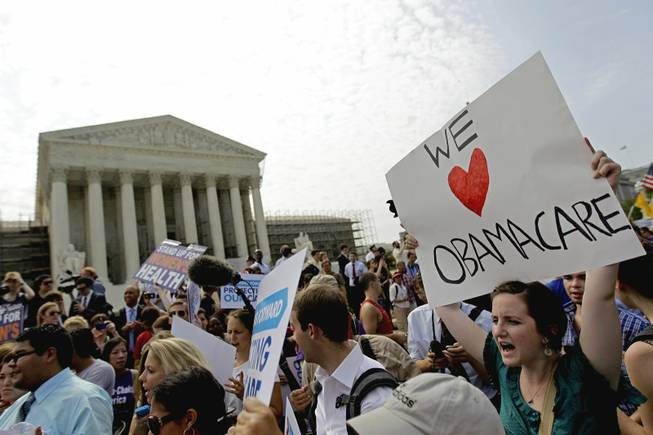
David Goldman / AP
Supporters of President Barack Obama’s health care law celebrate outside the Supreme Court in Washington, Thursday, June 28, 2012, after the court’s ruling was announced.
Friday, June 29, 2012 | 2 a.m.
Affordable Care Act could raise insurance cost
KSNV reports that the Supreme Court's decision to approve the Affordable Care Act will increase health insurance price for others, June 28.
Forget the political calculations and the constitutional questions.
For Las Vegas mother Alicia Santiago, the U.S. Supreme Court’s ruling Thursday on President Barack Obama’s health care law gives her hope she’ll be able to buy insurance for her adult son who’s learning disabled and epileptic.
For Reno business owner Tim Wulf, it means he may explore ways to reduce his workforce to qualify for exemptions that would help him afford the cost of the law.
And for Stasia Shaver, the ruling means she will now be waiting — for a political battle to play out at the state level to see if she and her daughters will once again be eligible for Medicaid after the state found she made $16 too much a month to qualify.
The court’s opinion Thursday upheld Obama’s landmark health care law — including the mandate that individuals carry health insurance by 2014. But it gave the states the ability to reject expanding Medicaid eligibility, gutting one of the law’s provisions meant to help low-income people comply with the mandate.
That puts Shaver and her family in limbo as they wait to see whether Gov. Brian Sandoval and lawmakers will choose to expand the Medicaid program.
She said she’s due for a pap smear and mammogram.
“I’ll have to wait until I’m sick enough to go to an emergency room, and I guess they’ll have to take me,” she said. “That seems like the rules of the game, and to me, that’s immoral. That’s reprehensible.”
Shaver and her two daughters had relied on $984 a month in Social Security from her estranged husband. The three qualified for Medicaid, until her oldest daughter turned 18. Then state officials calculated she and her youngest daughter made $16 a month too much to qualify.
Shaver, 51, and her oldest daughter, now 19, have no medical insurance. Her younger daughter, 11, who has asthma, gets Nevada Check Up, a state health insurance program for children.
Shaver’s case highlights the reason the Supreme Court’s opinion is particularly acute in the Silver State. One in five Nevadans don’t have health insurance, one of the highest rates in the nation.
The decision to uphold the law was welcome news for Santiago, 58, though she still wanted to know how expensive the health insurance would be — a question that won’t be known for sure until October 2013, when the state’s health insurance market is set up.
“People don’t go to the doctor, don’t go to the emergency room, because they’re afraid of that bill,” Santiago said. “They know they can’t afford it.”
She also said she couldn’t afford $500 a month in insurance for her son.
But Nevada also has the nation’s highest unemployment, and at least some employers say that the additional costs under the law, and the complicated rules to implement it, will only hurt the state’s economy.
Wulf, owner of two Jimmy Johns Gourmet Sandwich Shops in Reno, has 64 employees right now. The law has certain exemptions for businesses with fewer than 50 employees.
“If the existing labor we have is too expensive, we’ll have to find ways to reduce labor,” said Wulf, who has been a vocal advocate for Republican nominee Mitt Romney. Specifically, he might have to look at new technologies or outsourcing to get below 50 employees, he said.
But some say the Affordable Care Act will free them from the stress and uncertainty of the previous health insurance market, allowing them to take more risks and work harder.
Natalie Purcell, 24, of Las Vegas joined her father’s health insurance under a provision that lets children up to 26 stay on their parents’ health insurance.
But before the court’s decision, Purcell worried about whether her husband would be able to switch jobs. He has a heart arrhythmia, which would make getting insurance with a pre-existing condition difficult.
With insurance companies not allowed to discriminate against pre-existing conditions, they don’t have to feel “tied down to a company or him having to have a corporate job because of insurance,” she said.
Minerva Rivera, 36, of Las Vegas said she feels freedom to advance in her job without worrying about earning too much to qualify for government health benefits.
Rivera has muscular dystrophy and gets Medicaid. She works as an advocate at the Southern Nevada Center for Independent Living.
“Right now, we have to be cautious about how much we earn,” she said of herself and her husband, who also has a medical condition. “For people like myself, we want to work, but we’re afraid by doing so, we’ll lose our medical benefits.”
“There’s hope for the future to prosper.”

Join the Discussion:
Check this out for a full explanation of our conversion to the LiveFyre commenting system and instructions on how to sign up for an account.
Full comments policy